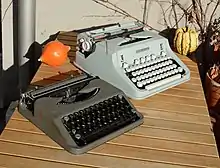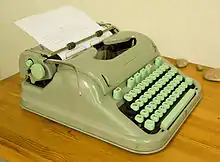Hermes 3000
The Hermes 3000 was a lightweight, segment-shifted portable typewriter manufactured by Paillard-Bolex.[1][2] "Bulbous" and "angular" in shape,[3] it came with a fitted, hard-shell removable cover. The machines were built in Yverdon, Switzerland, by Paillard S.A.[4]


The Hermes 3000 was introduced in 1958[5] as a successor to the Hermes 2000.[2] The original Model 1 was produced until 1966; with subsequent design modifications to the external casing and a variety of subtle changes in colour finishes, the Hermes 3000 was manufactured into the 1980s.[5] Although it was a portable machine, the Hermes 3000 had a few deluxe features, such as a "beyond the margins" key, which could also be depressed to free any jammed keys and return them to their resting position.[6] The typewriters predominantly came in a light green (occasionally described as a mint[7] or "sea-foam green") colour.[8]
In popular culture
William Kotzwinkle's 1972 novel was named Hermes 3000 after the machine.[9] During his acceptance speech for "Best Screenplay (Brokeback Mountain)" at the 2006 Golden Globes, author Larry McMurtry specifically mentioned his Hermes 3000, stating: "Most heartfelt, I thank my typewriter. My typewriter is a Hermes 3000, surely one of the noblest instruments of European genius. It has kept me for thirty years out of the dry embrace of the computer".[10][11]
Other notable users of the machine are Sam Shepard, Eugène Ionesco and Stephen Fry.[2] Beat writer Jack Kerouac wrote his final novel, Vanity of Duluoz,[12] on the Hermes 3000 in 1966. In a March 2018 auction at Bonhams in London, the Hermes 3000 on which Sylvia Plath had typed her only novel—The Bell Jar—in 1962 was sold for £26,000[13] ($46,071).[note 1] In 2013, in an appearance on BBC Radio 4's Desert Island Discs, actor Tom Hanks named the Hermes 3000 as the luxury item he would choose to take with him.[16][note 2]
Notes
- Described in The Financial Times as "a mint-green Hermes 3000 typewriter, lightly smudged, bought in Boston in 1959",[14] The Guardian later noted that the Bonhams' sale placed the value of Plath's Hermes "comfortably above Jack Kerouac’s, also a green Hermes, which pulled in $22,500 (£16,000), and John Updike’s $4,375 (£3,110)".[15]
- Hanks has been described as a "connoisseur" of typewriters, possessing 250 of the machines.[17] In a 2013 opinion piece for The New York Times, Hanks described the Hermes range as the "Cadillac of typewriters".[18]
References
- "Hermes". The Rotarian. July 1968. p. 15.
- Richard Polt (12 November 2015). The Typewriter Revolution: A Typist's Companion for the 21st Century. Countryman Press. ISBN 978-1-58157-587-3.
- Polt, Richard (2015-11-12). The Typewriter Revolution: A Typist's Companion for the 21st Century. The Countryman Press. ISBN 9781581575873.
- R. James Breiding (10 January 2013). Swiss Made: The Untold Story Behind Switzerland's Success. Profile Books. ISBN 978-1-84765-809-8.
- "Hermes 3000 typewriter". typewriters.ch.
- "How your Hermes 3000 Works" (PDF). Hermes: 7. Retrieved 1 December 2018. Cite journal requires
|journal=(help) - "The Fine Books Blog: February 2018 Archives". www.finebooksmagazine.com. Retrieved 2018-12-01.
- Polt, Richard (2015-11-12). The Typewriter Revolution: A Typist's Companion for the 21st Century. The Countryman Press. ISBN 9781581575873.
- Kotzwinkle, William (1972). Hermes 3000. Pantheon Books. ISBN 9780394476216.
hermes 3000.
- Richard Polt (12 November 2015). The Typewriter Revolution: A Typist's Companion for the 21st Century. Countryman Press. ISBN 978-1-58157-587-3.
- Keller, Julia; Elder, Robert K. (January 20, 2006). "What's so special about a Hermes 3000?". Chicago Tribune.
- Cockington, James (30 March 2011). "Staying true to type". Sydney Morning Herald. Retrieved 6 January 2019.
- Dugdale, John (2018-03-22). "Is Sylvia Plath's driver's license worth more than a letter from Dickens?". the Guardian. Retrieved 2018-12-01.
- "Subscribe to read". Financial Times.
- Bolick, Kate (21 April 2018). "Who Bought Sylvia Plath's Stuff?". New York Times. Retrieved 6 January 2019.
- Brown, Helen (2017-10-15). "Tom Hanks's typewriter stories reveal his inventive mind – Uncommon Type, review". The Telegraph. ISSN 0307-1235. Retrieved 2018-12-01.
- Brown, Helen (15 October 2017). "Tom Hanks's typewriter stories reveal his inventive mind – Uncommon Type, review". The Telegraph – via www.telegraph.co.uk.
- Hanks, Tom (August 3, 2013). "I Am Tom. I Like to Type. Hear That?". The New York Times.